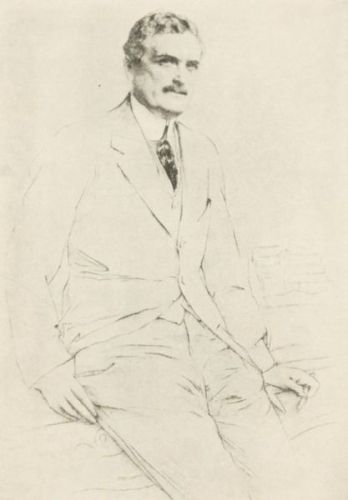
MYRON T. HERRICK
UNITED STATES AMBASSADOR TO FRANCE
From a hitherto unpublished drawing by Royer
PASSED BY THE CENSOR
THE EXPERIENCE OF AN
AMERICAN NEWSPAPER MAN IN FRANCE
BY
WYTHE WILLIAMS
PARIS CORRESPONDENT OF THE NEW YORK TIMES,
OFFICIALLY ACCREDITED TO THE FRENCH
ARMIES ON THE WESTERN FRONT
WITH AN INTRODUCTION BY
MYRON T. HERRICK
FORMER UNITED STATES AMBASSADOR TO FRANCE
NEW YORK
E.P. DUTTON & COMPANY
681 FIFTH AVENUE
Copyright, 1916
By E.P. DUTTON & COMPANY
PRINTED IN THE UNITED STATES OF AMERICA
TO VIOLA
PREFACE
Special correspondents in great numbers have come from America into theEuropean "zone of military activity," and in almost equal numbers havethey gone out, to write their impressions, their descriptions, theirhistories, their romances and songs.
Other correspondents who are not "special," but who by the grace ofthe military authorities have been permitted to enter the forbiddenterritory, and by the favor of the censor have been allowed to tellwhat they saw there, have entered it again and again at regularintervals.
These are the "regular" correspondents, who lived in Europe before warwas declared, and who during many idle hours speculated on what theywould do with that great arm of their vocation—the cable—when theexpected hour of conflict arrived.
Few of their plans worked out, and new ones were formed on theminute—on the second. For the Germans did not cut the cable, as someof the correspondents, in moments of despair, almost hoped they woulddo, and the great American public clamored insistently for the "news"with its breakfast.
It is a journalist's methods in covering the biggest, the hardest"story" that newspapers were ever compelled to handle, that this bookattempts to describe.
Wythe Williams.
Paris, October, 1915.
AN ENDORSEMENT
By Georges Clemenceau
Former Premier of France.
"In the crowded picture which this American journalist has presented werecognize our men as they are. And he pronounces such judgment as toarouse our pride in our friends, our brothers and our children. Sucha people are the French of to-day. They must also be the French ofto-morrow. Through them France sees herself regenerate.
"Of our army, Mr. Wythe Williams says:
"'It seems to me to be invincible from the standpoints of power,intelligence and humanity.'
"Is there not in that something like a judgment pronounced uponFrance before the people of the world? Where I am particularlysurprised, I admit, is that the eye of a foreigner should have been sopenetrating, and that our friendly guest should have coupled the ideaof an 'invincible' army with the supreme ethical consideration of its'humanity.'
"Mr. Wythe Williams is right to proclaim this, even though it issomething of a stroke of genius for a non-Frenchman to have discoveredit."—(From an editorial in L'Homme Enchainé.)
LETTER TO THE AUTHOR FROM SENATOR LAFAYETTE YOUNG